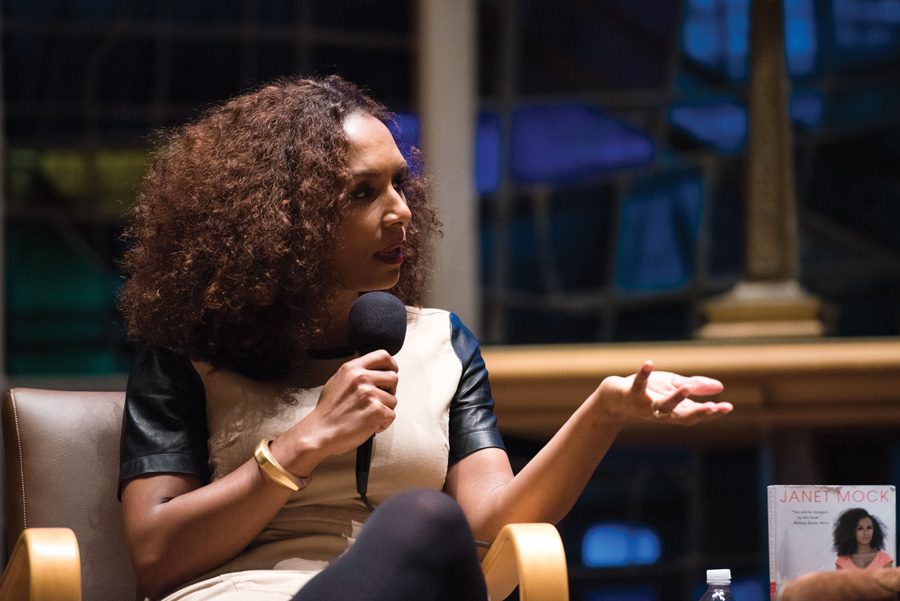Transgender rights activist Janet Mock discusses identity, safe spaces
Daniel Tian/Daily Senior Staffer
Transgender activist Janet Mock speaks to an audience in Alice Millar Chapel on Friday. Mock discussed intersectional identities and encouraged people to be allies to the transgender community.
April 9, 2017
Writer, transgender rights activist and TV host Janet Mock addressed issues on intersectional identities and encouraged people to take an active role in “carving out” safe spaces for the transgender community during an event at Alice Millar Chapel on Friday.
More than 50 people listened to Mock’s conversation with Medill senior and former Daily staffer Bailey Williams, during which Mock reflected on her own intersectional identity. The event was hosted by Family Action Network, an organization that uses collaborative programming to connect and inspire people.
Mock spoke about her experience growing up poor and black and how those parts of her identity made it more difficult to come out as a transgender woman.
“I had learned through culture, the world, family, friends (and) haters that by speaking out I will be shunned or exiled,” Mock said.
Mock said her activism began after finding a community where she felt comfortable enough coming out as a transgender woman.
Though Mock told the audience about her personal life, she decided not to tell most of her stories. Instead, she encouraged people to read her book, “Redefining Realness.” She said she wrote the book for readers to absorb her story the way she wanted them to.
Family Action Network executive director Lonnie Stonitsch said she admired and respected Mock’s decision to not recount all of her experiences. It distinguished her from other speakers and did not satisfy the “voyeuristic feeling” audiences may seek when listening to personal narratives, Stonitsch said.
In addition to speaking about her life, Mock discussed how to become an ally. The first step is to recognize the complexity of every person’s identity, Mock said. She said education about identity, inclusion and how to be an ally should go further and was critical of environments that are unwilling to change the “language of cis-culture” that excludes transgender people.
Mock recalled when a teacher made an extra effort to create a safe space for her by speaking with other students rather than leaving her to handle the situation alone. That kind of action is needed to make transgender students comfortable with their environment, Mock said.
“Students are not dropping out of school,” she said. “They are being pushed out.”
Transgender individuals know coming out to unsupportive and unwelcoming peers is violent, Mock said.
She called on people to take greater initiative toward becoming allies of the transgender community.
Lindsay Janasiak, an Evanston resident, said she attended the event to learn how to be the best ally she could. She said Mock delivered her message with a lot of “poise” and “levity.”
“It inspires me to examine my own challenges that I encountered,” Janasiak said.
Stonitsch said she hoped the conversation with Mock would encourage empathetic dialogue that would “connect with others and open their hearts.”
Part of the event’s goal was to educate people who were less fluent in vocabulary and issues of the transgender community, Stonitsch said.
“Any time you can create a shared vocabulary you are creating the groundwork for collaboration and connection,” she said.
Email: [email protected]
Twitter: @_perezalan_


